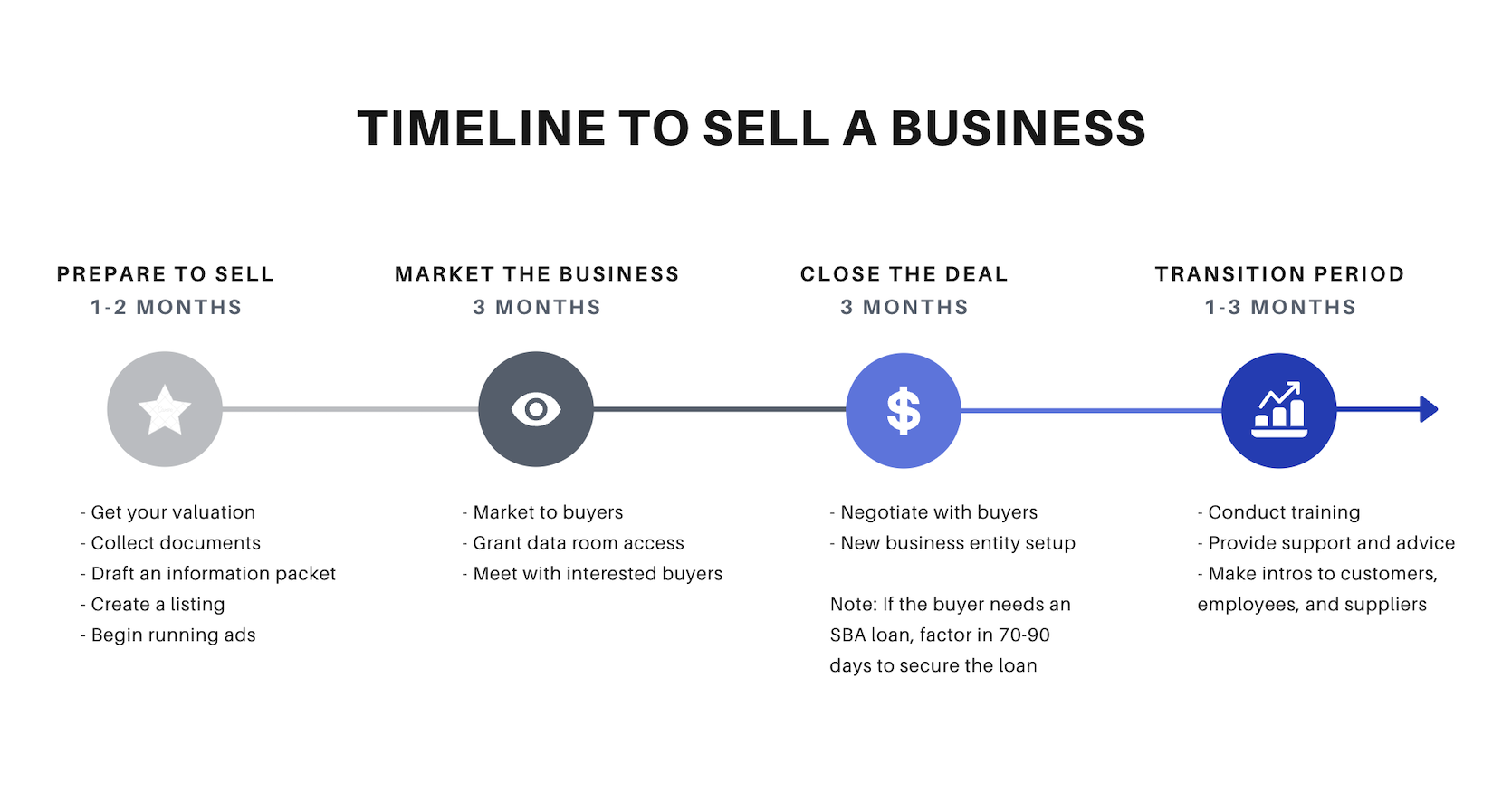Not quite ready to sell?
Subscribe to receive the latest resources for small business owners.
One of the most common questions we hear from new sellers is “how long will it take to sell my business?” It's a fair and important question as we know there tend to be plans happening around the sale.
It also might make you feel a bit better to state the obvious: selling a business isn't something most people go through on a regular basis. To make matters even more complicated, there isn’t a ton of great information out there to illuminate what can sometimes be a tricky road. Good thing you’re here because we walk this road every day!
While it’s true no two deals are exactly alike, rest assured we’ve seen enough to steer you in the right direction and avoid common pitfalls. This post is meant to summarize the stages we commonly see when working with small business owners. Even though your deal may differ in one way or another, you can expect to touch on many of these milestones throughout the lifecycle of the sale.

Prepare to Sell (1-2 Months)
This is the stage where you get your ducks in a row so you can put your best foot forward when you go to market. You’ll need to work with a broker (may we suggest Beacon?) to get your materials together to produce a business valuation as well as a data room. Though sometimes tedious to compile, your business documents are critical for attracting serious buyer consideration. Once you’ve submitted the requisite information on your business, it’s time to list the business and kick off the marketing phase.
Market the Business (3 Months)
During the marketing phase, your broker should really start to earn their commission. This is where your broker can introduce you to known prospective buyers and supplement demand by going out and acquiring new buyers (we do both at Beacon). You want to safely get in front of people and work with your broker to drum up LOIs. Think of your broker as one part promoter, one part bouncer, and one part wingman or woman. The thing to focus on at this stage is keeping the communication lines open with your broker while continuing to run your business. You’ll also begin meeting with buyers.
Close the Deal (3 Months)
This is fun for some and anxiety-inducing for others. We know that you are deeply connected to your business in a lot of different ways and that deals can get emotional because of all the effort you’ve poured in over the years. We’re here to guide you through the LOI process based on the market conditions we experience on a daily basis. There can also be some interesting financing structures in small business deals that we’ll help you navigate. On the other end of the deal, the buyer will be finishing the final round of diligence and getting the structures in place for a handoff.
Transition Period (1-3 Months)
Chances are the buyer didn’t buy your business to just take over a lease. They paid a premium against the value of the assets because they know they’re buying a living, breathing, cash-flowing business. As such, the new buyer will want to make sure they’re extracting as much of the goodwill value as possible—the transition period is key to realizing that value. The best way to ensure the business continues to hum along smoothly is through on-the-job training, introductions to employees, customers, and suppliers, and generally being available for advice during the transition period. The good news for you is that you'll likely continue to get paid during this period while simultaneously de-risking your Seller Note by training a competent new owner.
Hopefully, you have a better understanding of the four main phases in the sales process. We also want to reiterate that these are just meant to serve as guidelines. In reality, every business is different. Feel free to reach out if you have any questions regarding the sales timeline for your specific business.
Not quite ready to sell?
Subscribe to receive the latest resources for small business owners.

Anthony is the Marketing Lead at Beacon. He previously spent his career working for software companies in Silicon Valley but is now focused on making it easier to buy and sell Main Street businesses. Anthony studied Economics at Brown University and resides in Austin.
Information posted on this page is not intended to be, and should not be construed as tax, legal, investment or accounting advice. You should consult your own tax, legal, investment and accounting advisors before engaging in any transaction.

Calder Capital

Sam Domino


